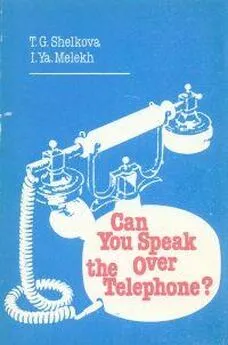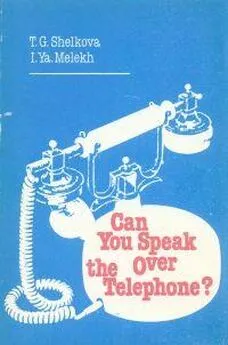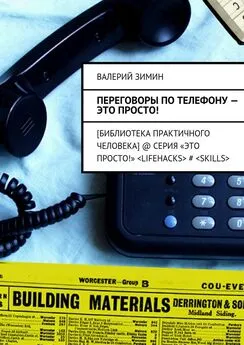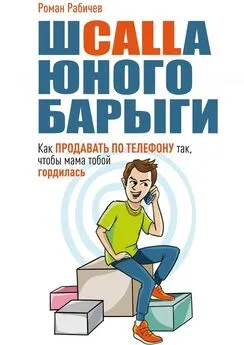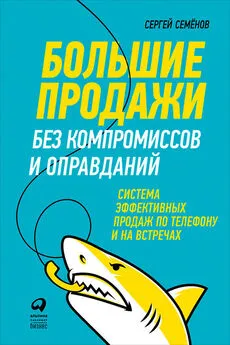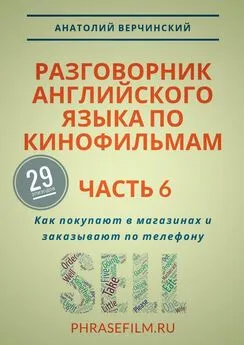Т. Шелкова - Как вести беседу по телефону
- Название:Как вести беседу по телефону
- Автор:
- Жанр:
- Издательство:Высшая школа
- Год:1989
- Город:М.
- ISBN:5-06-001624-2
- Рейтинг:
- Избранное:Добавить в избранное
-
Отзывы:
-
Ваша оценка:
Т. Шелкова - Как вести беседу по телефону краткое содержание
Ведение разговора по телефону на иностранном языке требует от обучающегося определенных навыков понимания, восприятия и удержания в памяти услышанного, а также незамедлительной словесной реакции на услышанное. Недостаточное развитие этих навыков является препятствием к тому, чтобы хорошо и уверенно говорить по телефону.
Пособие ставит своей целью помочь учащимся овладеть навыками беседы по телефону, пользоваться общепринятой терминологией.
Во второе издание (1-е — 1980 г.) внесены исправления редакционного характера.
Для лиц, самостоятельно совершенствующих свои знания английского языка.
Как вести беседу по телефону - читать онлайн бесплатно полную версию (весь текст целиком)
Интервал:
Закладка:
B: …
A: That’s all right.
14. A: …
B: This is 520-4824. But there is no one by the name of Scott here.
15. A: Hello, hello… I can’t hear what you are saying.
B: …
16. A: Operator, I’ve been disconnected with my caller. Could you help me?
O: …
17. A: I want to place a call at Leningrad.
O: …
A: 274-20-18.
O: Is it a credit card call?
A: …
18. O: Would you like to make a person-to-person call?
A: …
19. O: Will you accept a collect call from Mr Dowden?
A: …
20. A: There appears to be some interference in our connection with Moscow. Could you do anything about it?
O: …
V. Spell the names on the phone.
Костиков, Рязанов, Орлов, Ордынский, Соловьев, Бардин, Соколов, Иванов, Дарский, Кружковский, Петров, Бучнев.
III
TOPICAL TELEPHONE CONVERSATIONS
A. APPOINTMENTS
Secretary: Two-four-nine; double eight-double two.
Mr Ivanov: I would like to make an appointment with Mr Jeffries. This is Mr Ivanov speaking.
Secretary: Oh, yes, Mr Ivanov. Good morning. I’ll get his schedule. Are you there?
Mr Ivanov: Yes.
Secretary: When would you like to come, Mr Ivanov?
Mr Ivanov: Tomorrow, if possible.
Secretary: I’m afraid he’s tied up tomorrow. Is it urgent? If it is, perhaps we could fit you in somewhere.
Mr Ivanov: No, it isn’t that urgent. Is the day after tomorrow possible?
Secretary: What time would you like to come?
Mr Ivanov: As late as possible in the afternoon.
Secretary: I’m sorry, that afternoon’s full too. How is Friday afternoon at five?
Mr Ivanov: Yes, that’s perfect, thank you. Good-bye.
Mr Zonov: Hello. Is this Mr Summerset? This is Mr Zonov speaking.
Mr Summerset: Hello. How are you?
Mr Zonov: Fine, thanks. Pretty busy. How are you, Mr Summerset?
Mr Summerset: O.K. I can’t complain.
Mr Zonov: Glad to hear that. There is something I’d like to talk to you about. Can we meet early next week?
Mr Summerset: Sure, with pleasure.
Mr Zonov: Could you come in my office, say, on Monday afternoon?
Mr Summerset: Let me consult my schedule. Yes, I guess it’ll be all right. What time do you suggest?
Mr Zonov: Suppose we make it 3.30. Will it suit you?
Mr Summerset: Yes, that’s fine.
Mr Petrov: Hello. May I speak to Mr Ward, please?
Mr Ward: Speaking. Who is it, please?
Mr Petrov: Good morning, Mr Ward. This is Petrov, Mr Gromov’s assistant. Mr Gromov had to fly to Chicago on urgent business last night. He could not see you personally and so he asked me to get in touch with you instead and settle the matter you discussed.
Mr Ward: Sure, Mr Petrov. I’ll tell you what. Could you come over to my office, say, about 4 o’clock? Mr Petrov: Yes, that’s fine for me, Mr Ward. I’ll be there.
Mr Ward: O.K., I’ll be expecting you. And I can give you a ride afterwards.
Mr Nikolaev: Is that Dr Morton’s office?
Secretary: Yes, sir.
Mr Nikolaev: This is Nikolaev speaking. Could I have an appointment with the doctor in the middle of next week, please?
Secretary: Just a minute, sir: I’ll check his schedule. Will Wednesday be all right?
Mr Nikolaev: Yes, it’s fine. What time, please?
Secretary: Wednesday, at 6 p.m.
Mr Nikolaev: Thank you. Good-bye.
Secretary: Thank you, sir. Good-bye.
Mr Nikolaev: Good morning. Could I speak to Dr Williams’ secretary, please?
Secretary: Speaking.
Mr Nikolaev: My name is Nikolaev. I would like to have an appointment with the doctor.
Secretary: Is it something urgent, sir?
Mr Nikolaev: Yes, rather. My son needs a dentist.
Secretary: I see. How old is he?
Mr Nikolaev: He is about eight.
Secretary: Can you bring him tomorrow at eleven?
Mr Nikolaev: That’s Thursday, isn’t it?
Secretary: Yes, sir.
Mr Nikolaev: That’s fine. Thank you very much.
Secretary: Good-bye.
Secretary: Hello. May I speak to Mr Smirnov, please?
Mr Smirnov: Smirnov speaking.
Secretary: Mr Smirnov, this is Mr Abbott’s secretary. I’m calling to confirm your appointment with Mr Abbott for next Friday at 4 p.m.
Mr Smirnov: Thank you. I’m looking forward to seeing Mr Abbott next Friday. Will you give him my best regards, please.
Secretary: I will. Good-bye, Mr Smirnov.
Mr Smirnov: Good-bye.
Mr Stunns: Hello. Could I speak to Mr Ivanovo secretary, please?
Secretary: Good morning. This is Mr Ivanov’s secretary.
Mr Stunns: This is Stunns, of the Ministry of Transportation. I would like to know whether Mr Ivanov has received an invitation to our Annual Meeting?
Secretary: Yes, Mr Stunns, we have received your invitation, thank you.
Mr Stunns: Is Mr Ivanov coming?
Secretary: No, Mr Stunns, he is not. I am sorry but Mr Ivanov left town and he won’t be back until next week. Haven’t you received our letter informing you that he is not attending the Meeting?
Mr Stunns: No, not yet.
Secretary: We sent it to the Department yesterday afternoon.
Mr Stunns: It’s a pity that Mr Ivanov is not able to be present at our Annual Meeting. Give him my best regards when he returns, please.
Secretary: Thank you, I will. Good-bye.
Mr Stunns: Good-bye.
M.D.: Maintenance Department.
Customer: I would like to report the fault of my phone to the operator.
M.D.: What’s wrong with it? Is it quite dead?
Customer: No, not quite. I can’t get a call through. I hear the voice on the other end of the line, but they seem not to hear me. And there is no proper buzz.
M.D.: From where are you talking now?
Customer: From my neighbour’s phone.
M.D.: Give me your neighbour’s telephone number and your own phone number, please. (Customer tells the maintenance clerk his neighbour’s and his own telephone numbers.) Thank you. I’ll get in touch with the switchboard, and call you back. (The telephone rings up in five minutes.) This is the Maintenance Department. Eight-four-two; double three-double two is out of order. We are sending a repair-man tomorrow morning. Sorry, we cannot do anything now. Good-bye.
I. Read these dialogues and pay attention to telephone phrases.
II. Reproduce these dialogues as close to the text as possible.
III. Practise spelling different names over the telephone.
IV. What would you say in reply to these remarks?
1. This is Mr Slow speaking. I would like to make an appointment with Mr Gorelov. 2. I’m afraid I’ll be tied up tomorrow. Could you suggest an alternative date? 3. There’s something I’d like to talk to you about. When can we meet? 4. I’m afraid we cannot fit you in today but we could recommend you another dentist. 5. This is Mr Fray’s secretary. I’m calling to confirm your appointment with Mr Fray for tomorrow, at 10 a.m. 6. I’m calling to let you know that Mr Bell will not be able to keep the appointment. He is away from London and won’t be back until after Wednesday. We are sorry about this.
V. In what situations would you say the following?
1. Sorry, we cannot fit you in today. 2. Let me consult my schedule. 3. Could you give me an alternative date? 4. I’m afraid Mr Petrov will not be able to keep the appointment. 5. Could I make an appointment with the dentist? 6. I can give you a lift afterwards. 7. We’ve made an appointment for Wednesday tentatively. 8. I’m calling to confirm your appointment with my colleagues. 9. We’re looking forward to seeing you next Sunday. 10. I’d like to report the fault of my phone. 11. The line is completely dead.
VI. a) Make an appointment by phone:
1. with your counterpart; 2. with a doctor; 3. with an engineer from the T.V. repair service; 4. with a dentist; 5. with a friend of yours; 6. with Mr Brody, Sales Manager of a big company.
b) Confirm the appointment by phone.
c) Phone Mr Slow and tell him that you are unable to keep the appointment and give your reason.
Working in groups of two, read the following dialogues aloud.
The Protocol Department arranged a visit of diplomats accredited at Moscow to the Cardiological Centre of the Ministry of Public Health. Here is a talk between a Soviet official and an Australian diplomat concerning the details of the visit.
Mr Ward: Good morning. This is Ward of the Australian Embassy speaking.
Mr Orlov: Good morning, Mr Ward. Orlov speaking. Can I be of any help to you?
Mr Ward: I am calling to confirm our visit to the Moscow Cardiological Centre. Any changes in the schedule of the visit, Mr Orlov?
Mr Orlov: No changes so far. The visit is arranged for the heads of staff and other members of foreign missions and embassies in Moscow.
Mr Ward: The date and time remain as mentioned in the memo?
Mr Orlov: Yes, next Tuesday, 11 a.m.
Mr Ward: Thank you. Are we supposed to go to the Cardiological Centre on our own?
Mr Orlov: No, Mr Ward, we invite you to come to the Foreign Ministry first, and then we’ll proceed to the Centre in buses.
Mr Ward: That’s a good idea. Any chance of seeing you, Mr Orlov, at the Ministry?
Mr Orlov: Of course, I’ll be accompanying you to the Cardiological Centre.
Mr Ward: Fine. See you next Tuesday, then. Good-bye.
Mr Orlov: Good-bye, Mr Ward.
to call to confirmзвонить по телефону для того, чтобы подтвердить
to arrange a visitорганизовать посещение
proceed v зд. продолжить путь
I. Summarize the dialogue in a talk of 2-minutes duration.
II. Make arrangements through the Protocol department over the phone about a visit of Soviet diplomats to the English parliament or the US Congress.
Читать дальшеИнтервал:
Закладка:
